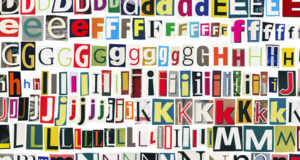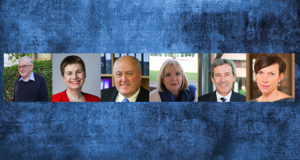Capital letters create alternative forms for each character in the Roman alphabet. They help to mark the particular functions of certain words: those that start a sentence or identify proper nouns for persons (e.g. Quentin Bryce) or places (e.g. Australia), ...
More »On the move: September
Retiring after 67 years at UQ The University of Queensland’s Emeritus Professor Edward White, better known as Ted, from the School of Chemical Engineering, is about to hang up his academic gown. Ted has been a fixture of UQ for a ...
More »Strictly speaking: anamorphosis
In classical Greek, anamorphosis meant “transformation”, and was first applied by Renaissance artists to a highly regarded technique of manipulating the perspective on an image. It presented an apparently distorted drawing of an object, which when seen reflected in a ...
More »Strictly speaking: masstige
Masstige is defined as ‘a class of mass-produced, relatively inexpensive goods which are marketed as luxurious or prestigious’. It started out as a specialist marketing term at least 20 years ago, particularly in the beauty and fashion industries, but has ...
More »The fight for free speech: the culturally diverse case
Geoffrey Miller is worried about academic freedoms. As a self-identified “aspie” and “nerd”, Miller has already laid out the case for us to consider the effect free speech policies can have on those academics and students who are ‘neurodivergent’ or ...
More »Strictly speaking: software carpentry
The ancient craft of carpentry still implies hands-on working with wood, using tools such as saw, hammer and nails to join the pieces into weight-bearing structures. So the phrase software carpentry used for an advanced training course makes an odd ...
More »Don’t risk it: why universities need to manage IT security risks closely
Universities have embraced technology as teaching and learning tools, while students and staff alike typically rely on connected devices for far more than just studying. As university campuses serve as the hub of student life, providing reliable, fast internet access ...
More »The fight for free speech: the neurodiversity case
Would Sir Isaac Newton flourish in an academic career were he alive today? The great man was said to have “an obsessive, paranoid personality, with Asperger’s syndrome, a bad stutter, unstable moods, and episodes of psychotic mania and depression”. Imagine then ...
More »The fight for free speech: the battle for universities
Lest. We. Forget (Manus, Nauru, Syria, Palestine)." – Yassmin Abdel-Magied When you hear about slavery for 400 years – for 400 years! – that sounds like a choice. Like, you was there for 400 years and it’s all of y’all? ...
More »Sexual harassment in STEM: Will time ever be up?
Since the Harvey Weinstein allegations were publicised in October last year, it seems the world has shifted. For the first time, women appear to be asserting their power over sexual harassers and abusers, and are being validated for doing so. Among the swathe ...
More » Campus Review The latest in higher education news
Campus Review The latest in higher education news







